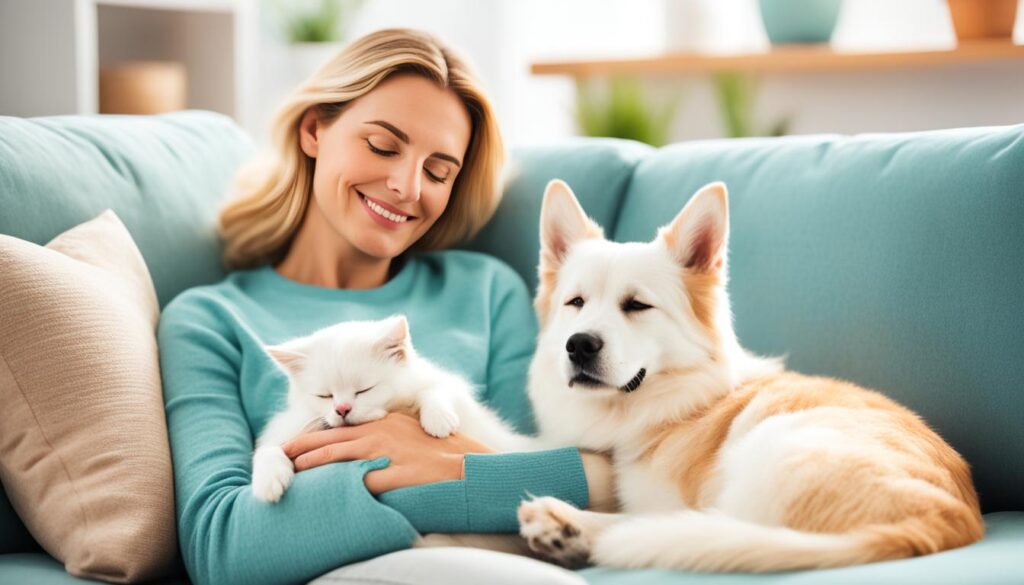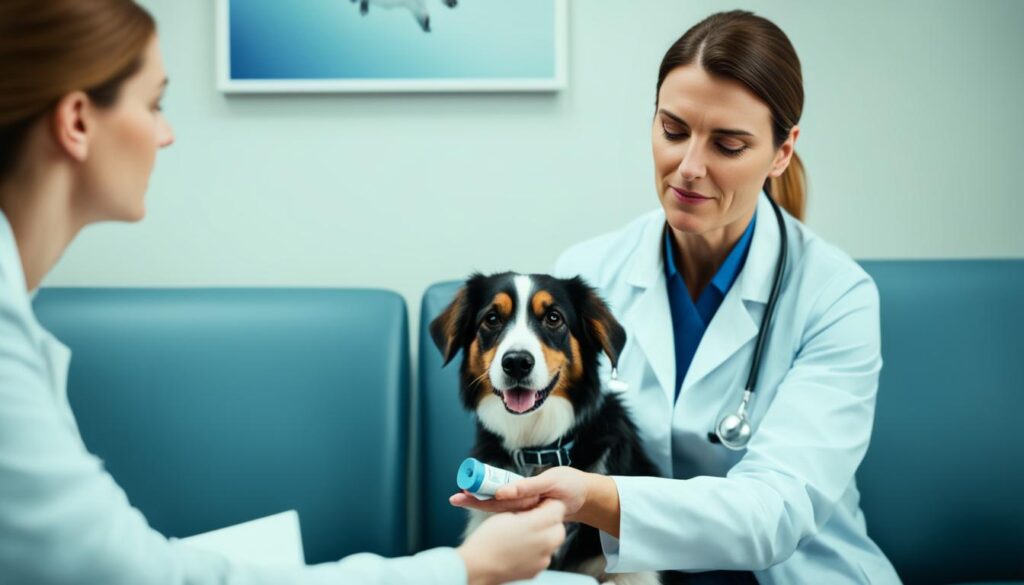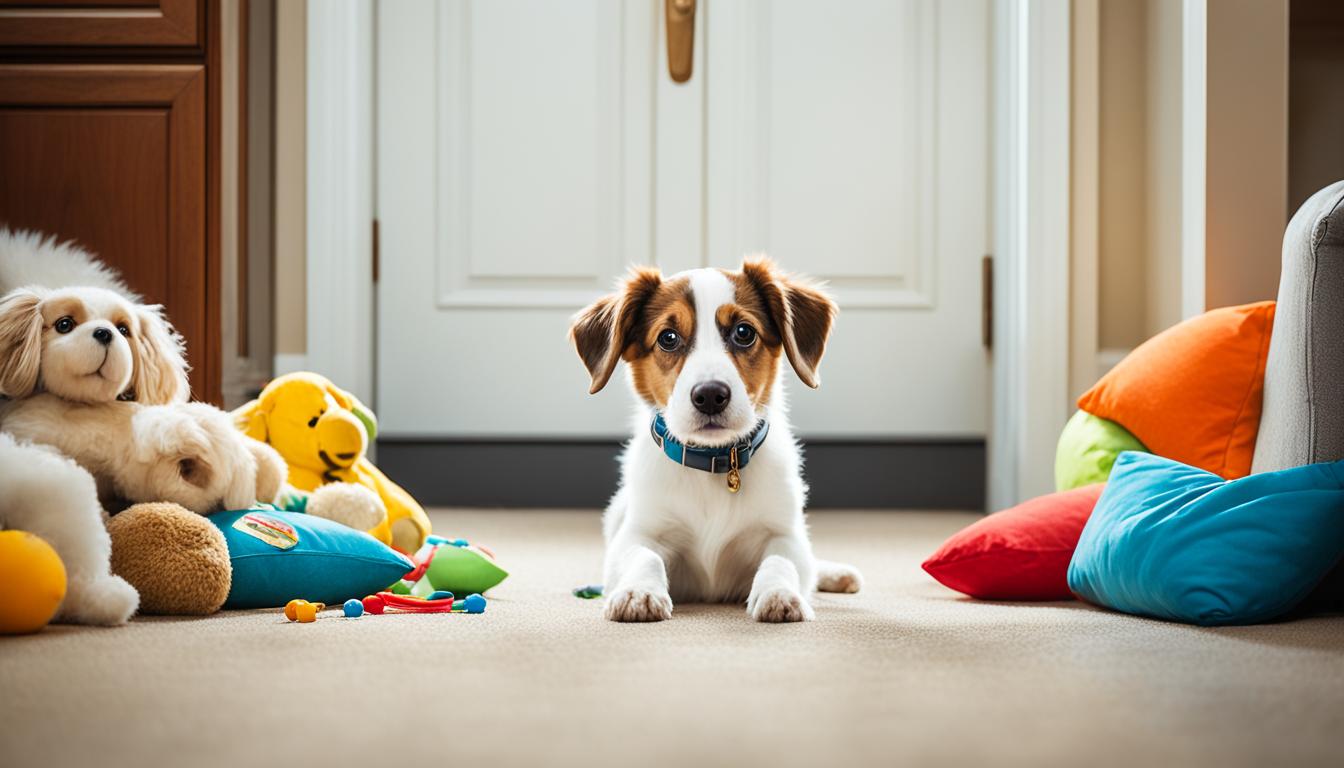As pet owners, we know that our furry friends bring us joy and companionship. However, just like humans, pets can experience anxiety, which can have negative impacts on their well-being. In this article, we will delve into the topic of pet anxiety and provide valuable insights on how to understand and manage it for better pet health. From recognizing behavioral changes to creating a calming routine and exploring natural approaches, we will cover various tips and strategies to help pets live anxiety-free lives.
Key Takeaways:
- Pet anxiety is a common issue that can negatively impact their mental health and overall well-being.
- Recognizing behavioral changes in pets can help identify signs of anxiety.
- Creating a calming routine and incorporating natural approaches can alleviate pet anxiety.
- Prioritizing proper nutrition, exercise, and positive pet-human interaction is important for managing anxiety.
- Seeking professional care and creating a harmonious household environment can contribute to anxiety management.
The Emotional Well-being of Our Pets: Recognizing Anxiety
Pets, like humans, can experience emotional well-being challenges, with anxiety being a common issue. To effectively manage pet anxiety, it is crucial to recognize the behavioral changes that may indicate their emotional distress. By understanding these changes, pet owners can promptly address anxiety and provide their pets with the support they need. In this section, we will explore how to identify behavioral changes in pets, recognize signs of stress, and emphasize the importance of addressing anxiety quickly.
Understanding Your Pet’s Behavioral Changes
Recognizing your pet’s behavioral changes is key to understanding their emotional well-being. Keep an eye out for the following signs that may indicate anxiety:
- Increased irritability or aggression
- Excessive barking or meowing
- Withdrawal or hiding
- Loss of appetite or overeating
- Changes in sleep patterns
By being attentive to these behavioral changes, you can gain insights into your pet’s emotional state and take appropriate action to alleviate their anxiety.
Identifying the Signs of Stress in Pets
Pets may exhibit various signs of stress when they are anxious. Look out for the following indicators:
- Excessive panting or drooling
- Excessive grooming or fur loss
- Restlessness and pacing
- Changes in litter box habits
- Excessive scratching or biting
By recognizing these signs of stress, pet owners can intervene early and implement strategies to manage anxiety effectively.
The Importance of Addressing Anxiety Quickly
Addressing pet anxiety quickly is vital to prevent further distress and promote their emotional well-being. Untreated anxiety can lead to more severe behavioral issues and impact the overall quality of your pet’s life. By taking proactive steps to address anxiety promptly, such as creating a calm and secure environment, providing mental stimulation, and seeking professional help when necessary, you can help your pet lead a happier and healthier life.
Companion Animals and Our Mental Health: A Symbiotic Relationship
The relationship between pets and humans goes beyond companionship. Pets can have a positive impact on our mental health, influencing the production of serotonin and dopamine. These chemicals, known as “feel-good” neurotransmitters, contribute to feelings of happiness and relaxation. By interacting with pets, we experience an increase in serotonin and dopamine levels, leading to improved overall well-being.
Pets also play a crucial role in reducing human loneliness and stress. Their unconditional love and affection provide us with a sense of companionship and support, especially during difficult times. Studies have shown that spending time with pets can help lower stress hormone levels, reduce feelings of loneliness, and promote emotional stability.

Pet companionship has been found to have various mental health benefits, including:
- Reduced anxiety and depression
- Enhanced mood and emotional well-being
- Increased feelings of self-worth and purpose
- Improved social interaction and communication
Whether it’s cuddling with a cat, walking a dog, or simply watching fish swim in an aquarium, the presence of pets can bring us immense comfort and tranquility. The bond we share with our furry friends goes beyond words and provides us with a sense of love and belonging.
How Pets Positively Influence Our Serotonin and Dopamine Levels
When we engage in activities with our pets, such as petting, playing, or even just looking into their eyes, our brains release serotonin and dopamine. These neurotransmitters are closely associated with feelings of pleasure, happiness, and relaxation. By stimulating the production of these chemicals, pets help us experience a natural mood boost, reduce stress levels, and enhance our overall mental well-being.
“The interaction between humans and animals has proven to be beneficial for our mental health, as it promotes the release of serotonin and dopamine, contributing to increased happiness and relaxation.”
The Role Pets Play in Reducing Human Loneliness and Stress
Loneliness and stress are pervasive issues in today’s fast-paced world. However, pets can provide solace and comfort, reducing these negative emotional states. The presence of a pet creates a sense of companionship and unconditional love, making us feel less lonely and more supported.
Interacting with pets has been shown to have several positive effects on stress reduction, including:
- Lowering blood pressure and heart rate
- Reducing cortisol levels (the stress hormone)
- Promoting relaxation and a sense of calm
Through their soothing presence and non-judgmental nature, pets have the incredible ability to alleviate human stress and provide comfort in times of need. Their companionship is a source of emotional support, making us feel understood, cared for, and less burdened by the challenges of life.
Creating a Calming Routine for Your Pet
Establishing a calming routine for pets is essential for managing anxiety and promoting their overall well-being. Pets thrive in environments with predictability and structure, as it helps reduce stress and anxiety. By incorporating relaxation techniques into your pet’s daily life, you can further enhance their ability to cope with anxiety.
The Benefits of Predictability and Structure in Pet Care
Pets thrive when they have a sense of predictability and structure in their daily lives. Having a consistent routine helps them feel secure and reduces anxiety. By providing regular mealtimes, exercise sessions, and playtime, you create a framework that your pet can rely on. This predictability helps them understand what to expect and gives them a sense of control.
Creating a structured environment also includes setting clear boundaries and establishing rules for behavior. Consistency in training and enforcing these rules helps pets understand what is expected of them and fosters a sense of security. When pets know what to anticipate and how to navigate their surroundings, they feel more at ease, resulting in reduced anxiety levels.
Integrating Relaxation Techniques into Your Pet’s Daily Life
In addition to predictability and structure, integrating relaxation techniques into your pet’s daily routine can provide further support in managing anxiety. Just like humans, pets can benefit from specific techniques that promote relaxation and reduce stress.
One effective relaxation technique for pets is massage therapy. Gently massaging your pet’s muscles and using gentle strokes can help release tension and promote relaxation. It is important to note that not all pets enjoy being touched in certain areas, so be attentive to their comfort and always respect their boundaries.
Another relaxation technique is the use of calming scents. Aromatherapy can be beneficial for pets, with lavender and chamomile scents known for their calming effects. Introducing these scents through essential oils or using pet-safe products with relaxing fragrances can create a soothing environment for your pet.
Lastly, providing a quiet and cozy space for your pet to retreat to is essential. Creating a designated area in your home where your pet can relax and feel safe allows them to unwind and recharge. This space can be equipped with their favorite toys, a comfortable bed, and soft lighting to enhance the calming atmosphere.
By incorporating these relaxation techniques into your pet’s daily life and establishing a calming routine, you can create a supportive environment that helps them manage anxiety and promotes their overall well-being.
Pet Health and Wellness Tips: Promoting an Anxiety-Free Lifestyle
A holistic approach to pet health and wellness is crucial for promoting an anxiety-free lifestyle. By prioritizing your pet’s nutrition and exercise, you can enhance their overall well-being and help combat anxiety. In this section, we will provide valuable tips on enriching your pet’s diet for optimal health and incorporating physical activity into their daily routine.
Enriching Your Pet’s Diet for Optimal Health
Proper nutrition is essential for maintaining your pet’s health and reducing anxiety. Consider the following tips to enrich your pet’s diet:
- Provide a balanced and species-appropriate diet that meets their nutritional needs.
- Incorporate high-quality protein sources, such as lean meats or plant-based alternatives, to support muscle development.
- Include fresh fruits and vegetables as a source of vitamins, minerals, and antioxidants.
- Consider adding omega-3 fatty acids, such as fish oil, to support joint and coat health.
- Consult with your veterinarian to ensure your pet’s diet is tailored to their specific needs.
Remember, a well-nourished pet is more likely to have a healthy immune system and better coping mechanisms to handle stress and anxiety.
Incorporating Physical Activity into Your Pet’s Routine
Regular physical activity is vital for your pet’s physical and mental well-being. Here are some tips to incorporate exercise into their daily routine:
- Take daily walks or engage in active play sessions to help burn off excess energy.
- Provide interactive toys or puzzle feeders to encourage mental stimulation and physical activity.
- Consider participating in agility training or other activities that allow your pet to utilize their natural instincts.
- Include scheduled playtimes with other pets or interactive sessions with you to promote socialization.
Physical exercise not only helps your pet maintain a healthy weight but also releases endorphins that can improve their mood and reduce anxiety.
Incorporating these pet care tips into your routine can greatly contribute to your pet’s overall health and wellness. Consistently providing a nutritionally balanced diet and ample opportunities for physical activity will help your furry friend lead an anxiety-free lifestyle.
The Science of Cuddles: Interacting with Your Pet for Mutual Stress Relief
The power of pet-human interaction should not be underestimated when it comes to managing anxiety. Affectionate behaviors, such as cuddling and petting, can have a calming effect on both pets and their owners, reducing stress and anxiety levels. Additionally, creating bonds through eye gazing and conversation with pets can further strengthen the human-animal bond and provide mutual stress relief.

Research has shown that physical touch, including gentle stroking and cuddling, releases oxytocin, a hormone associated with feelings of relaxation and bonding. This release of oxytocin not only benefits pets by reducing their anxiety but also has a positive impact on the pet owner’s well-being.
Engaging in affectionate behaviors with pets can also create a sense of security and trust. When pets feel loved and cared for, they develop a stronger bond with their owners, which in turn increases their confidence and resilience, helping them better cope with stressful situations.
Creating Bonds Through Eye Gazing and Conversation with Your Pet
Eye gazing is another powerful way to deepen the connection between pets and their owners. By maintaining eye contact with your pet, you can establish a sense of trust and understanding. Eye gazing releases oxytocin in both pets and humans, fostering a strong emotional bond.
Conversation, whether it’s talking to your pet or simply listening to their sounds and cues, can also strengthen the bond with your furry friend. By engaging in conversation, you create a sense of companionship and provide comfort. Pets often respond to their owners’ voices, and the simple act of speaking to them can provide reassurance and alleviate their anxiety.
Remember, every pet is unique, and it’s important to observe their reactions and preferences during these interactions. Some pets may prefer gentle touch, while others may respond better to conversations or eye contact. Pay attention to their body language and cues to determine what forms of interaction they enjoy the most.
By prioritizing affectionate interactions with your pet, you can create a harmonious and stress-relieving environment for both of you. Take the time to show your pet love and attention through cuddles, eye gazing, and conversation. These simple acts can have a significant impact on your pet’s anxiety levels and overall well-being, while also building a stronger bond between you and your furry companion.
Natural and Holistic Approaches to Alleviate Pet Anxiety
When it comes to managing pet anxiety, natural and holistic approaches can be highly effective. These methods provide safe and gentle alternatives to traditional medications, allowing pet owners to support their furry friends’ well-being in a holistic way.
Introducing Aromatherapy and Calming Scents into Your Pet’s Environment
Aromatherapy, the use of essential oils to promote physical and emotional well-being, can be beneficial for pets experiencing anxiety. By introducing calming scents into their environment, pet owners can create a soothing atmosphere that helps reduce stress and anxiety levels.
One popular method is to use a pet-friendly diffuser with essential oils specifically formulated for animals. Lavender, chamomile, and frankincense are known for their calming properties and can help create a sense of tranquility for your pet. However, it’s important to choose high-quality essential oils and consult with a veterinarian to ensure their safety and suitability for your pet.
The Benefits of Herbal Supplements and Nutraceuticals for Pet Anxiety
In addition to aromatherapy, herbal supplements and nutraceuticals can provide natural relief for pet anxiety. These products are formulated with botanical ingredients known for their calming and anxiety-reducing properties.
Popular herbal supplements for pet anxiety include valerian root, chamomile, and passionflower. These herbs have been traditionally used to promote relaxation and support the nervous system. Nutraceuticals, on the other hand, are specially formulated supplements that contain bioactive compounds to target specific health concerns, including anxiety.
Before introducing any herbal supplements or nutraceuticals to your pet, it’s crucial to consult with a veterinarian. They can guide you in choosing the right products and recommend appropriate dosages based on your pet’s individual needs.
Incorporating natural approaches like aromatherapy and herbal supplements into your pet’s anxiety management plan can provide valuable support, helping them lead a calmer and more balanced life.
Navigating Professional Care for Pet Anxiety
While pet owners can do their best to manage pet anxiety, there are instances where professional care becomes necessary. Consultation with a veterinarian or a professional trainer can provide specialized support tailored to your pet’s specific needs. Understanding the role of behavioral modification techniques and anxiety medications can further aid in effectively managing pet anxiety.
When to Consult a Veterinarian or a Professional Trainer
If you notice persistent or severe signs of anxiety in your pet, it’s important to seek professional care. Consult your veterinarian if your pet’s anxiety is impacting their overall well-being or if it is accompanied by other health concerns. A veterinarian can conduct a thorough assessment, rule out any underlying medical conditions, and recommend appropriate treatment options.
In some cases, consulting a professional trainer who specializes in pet anxiety can provide valuable guidance. A professional trainer can help you develop a customized behavior modification plan tailored to your pet’s specific needs. They will assess your pet’s triggers and develop strategies to help them cope with anxiety-inducing situations.
Understanding Behavioral Modification and Anxiety Medications
Behavioral modification techniques play a vital role in managing pet anxiety. These techniques focus on identifying and addressing the root causes of anxiety by gradually exposing pets to anxiety-inducing stimuli and teaching them alternative coping mechanisms. Professional trainers are skilled in implementing these techniques and can guide you through the process.
In some cases, anxiety medications may be prescribed to manage severe anxiety in pets. Medication can help reduce anxiety levels and enable pets to better respond to behavioral modification techniques. It should always be prescribed and monitored by a veterinarian to ensure appropriate dosage and effectiveness.

| Who to Consult | When to Consult |
|---|---|
| Veterinarian | If anxiety affects overall well-being or is accompanied by other health concerns |
| Professional Trainer | For specialized guidance in developing a behavior modification plan |
Navigating professional care for pet anxiety is crucial in providing comprehensive support for your pet’s well-being. Whether it’s consulting a veterinarian or a professional trainer, professional guidance can help effectively manage pet anxiety and improve your pet’s quality of life.
The Role of Exercise and Play in Combating Pet Anxiety
Exercise and play play a crucial role in managing pet anxiety and promoting their overall well-being. Engaging in interactive activities provides mental stimulation and helps divert pets’ attention from anxiety-inducing triggers, allowing them to release pent-up energy in a positive and constructive way. Additionally, outdoor adventures offer the opportunity for pets to explore, enjoy fresh air, and experience new environments, all of which contribute to their physical and mental health.
To combat pet anxiety, it is important to incorporate regular exercise and playtime into your pet’s routine. This not only helps burn off excess energy but also stimulates their mind and promotes a sense of well-being. Here are some tips for engaging pets in interactive activities and outdoor adventures:
Engaging in Interactive Activities for Mental Stimulation
- Puzzle toys: Provide your pets with puzzle toys that require problem-solving skills, such as treat-dispensing toys or interactive games. These toys keep pets mentally engaged and help redirect their focus away from anxious thoughts.
- Hide-and-seek: Hide treats or toys around the house for your pets to find. This activity stimulates their natural hunting instinct and keeps them mentally stimulated and engaged.
- Training sessions: Engage in regular training sessions with your pets. Not only does this provide mental stimulation, but it also strengthens the bond between you and your furry companion.
Engaging in these interactive activities helps keep pets mentally stimulated and distracted from anxiety-inducing triggers. It promotes mental well-being and contributes to a happier, calmer pet.
Outdoor Adventures: The Importance of Fresh Air and Exploration
Outdoor adventures are not only essential for physical exercise but also provide valuable mental and sensory stimulation for pets. Here are some ways to incorporate outdoor adventures into your pet’s routine:
- Daily walks: Take your pet for regular walks to explore the neighborhood, enjoy fresh air, and encounter new sights and smells. Walking provides physical exercise and mental stimulation, helping reduce anxiety.
- Hiking: If your pet enjoys longer walks and is comfortable on a leash, consider taking them on hikes. Hiking allows pets to explore new environments, experience different terrains, and expend their energy in a natural setting.
- Visit a dog park: Dog parks provide an opportunity for pets to socialize, interact with other dogs, and engage in play. This can help alleviate anxiety and provide a positive outlet for their energy.
Engaging in outdoor adventures allows pets to experience the world beyond their home, stimulating their senses and promoting a sense of overall well-being. It provides a healthy outlet for their energy and helps combat pet anxiety.

By incorporating exercise, interactive activities, and outdoor adventures into your pet’s routine, you can effectively combat pet anxiety and promote their overall mental and physical well-being. Remember to tailor these activities to your pet’s abilities and preferences, and always prioritize their safety and comfort. A happy, active pet is more likely to experience reduced anxiety and lead a healthier, more fulfilling life.
Pet Owner Tips for a Harmonious Household
A harmonious household plays a crucial role in managing pet anxiety. As pet owners, it is important to manage our own stress levels to provide a stable and supportive environment for our pets. This section will provide practical tips for pet owners on managing their own stress and creating a peaceful home environment that promotes their pets’ well-being. By prioritizing a harmonious atmosphere, pet owners can contribute to reducing anxiety levels in their furry friends.
Managing Your Own Stress to Better Support Your Pet
Managing stress is essential for both our own well-being and that of our pets. When we are stressed, our pets can pick up on our emotions, which can contribute to their anxiety levels. Here are some tips for managing your own stress to better support your pet:
- Practice self-care: Engage in activities that help you relax and unwind, such as exercise, meditation, or hobbies.
- Set boundaries: Prioritize your own needs and create a balance between work, personal life, and pet responsibilities.
- Seek support: Talk to friends, family, or a therapist about your stressors and concerns. Sometimes, a listening ear can make all the difference.
- Take breaks: Allow yourself time to recharge and take breaks from daily stressors.
- Practice mindfulness: Stay present in the moment and focus on the positive aspects of your life and your bond with your pet.
The Impact of a Peaceful Home Environment on Pet Anxiety
The home environment plays a significant role in the well-being of our pets. Creating a peaceful atmosphere can help reduce their anxiety levels and promote a sense of calm. Here are some tips for creating a peaceful home environment:
- Establish a routine: Pets thrive on predictability and structure. Create a daily routine that includes feeding, playtime, exercise, and relaxation.
- Create designated pet spaces: Provide your pet with their own comfortable space, such as a bed or a crate, where they can retreat when they need some quiet time.
- Use calming scents: Certain scents, such as lavender or chamomile, can have a soothing effect on pets. Consider using pet-safe aromatherapy products or diffusing essential oils.
- Minimize noise and disruptions: Keep the environment as quiet and calm as possible. Use white noise machines or calming music to mask any loud noises that may trigger anxiety in your pet.
- Ensure adequate exercise and mental stimulation: Regular exercise and mental stimulation are essential for reducing anxiety in pets. Provide opportunities for play, interactive toys, and puzzle games to keep your pet engaged and stimulated.
- Provide a safe and secure environment: Make sure your home is pet-proofed and free from hazards that may cause stress or anxiety for your pet.
By implementing these pet owner tips, you can create a harmonious household that supports your pet’s well-being and helps to manage their anxiety. Remember, your own stress management and the peaceful home environment you create are key factors in promoting a calm and happy life for your furry companion.
Conclusion
In conclusion, effectively managing pet anxiety requires adopting a comprehensive approach that addresses various aspects of your furry friend’s well-being. By combining different strategies and techniques, pet owners can provide their pets with the support they need to live anxiety-free lives.
One essential aspect of this comprehensive approach is creating a calming routine for your pet. Establishing predictability and structure in their daily lives helps reduce stress and anxiety levels. By implementing a consistent routine and integrating relaxation techniques, such as massage or guided meditation, you can provide a soothing environment for your pet.
Another crucial element is ensuring optimal nutrition and physical exercise for your pet. A well-balanced diet tailored to their specific nutritional needs contributes to their overall health and can help alleviate anxiety. Additionally, engaging in regular physical activity and interactive play can provide mental stimulation and help divert their attention from anxiety-inducing triggers.
Furthermore, building stronger bonds with your pet is vital in fostering trust and confidence. Regular affectionate behaviors, such as cuddling and petting, promote a sense of safety and security for your pet. Additionally, engaging in eye gazing and conversation with your pet strengthens the human-animal bond and creates a lasting connection.
By embracing this comprehensive approach, pet owners can effectively manage pet anxiety, promoting their pets’ overall health and well-being. Remember that every pet is unique, so it is essential to adapt these strategies to the specific needs and preferences of your furry friend. With patience, love, and the right support, you can provide an anxiety-free lifestyle for your cherished companion.
FAQ
How can I recognize if my pet is experiencing anxiety?
Look for behavioral changes such as excessive barking, aggression, destructive behavior, loss of appetite, or hiding. These signs may indicate that your pet is feeling anxious.
What should I do if I suspect my pet is anxious?
It’s important to address anxiety quickly to support your pet’s well-being. Start by creating a calm and predictable environment, and consider incorporating relaxation techniques into their daily routine. If the anxiety persists, consult a veterinarian or professional trainer for specialized support.
How do pets positively influence our mental health?
Pets can boost our mental health by increasing the production of serotonin and dopamine, the “feel-good” chemicals in our brains. They also provide companionship, reduce loneliness, and help us manage stress.
How can I create a calming routine for my pet?
Establish a consistent daily schedule for feeding, exercise, and rest. Introduce relaxation techniques such as gentle massage or using calming scents in their environment. Predictability and structure can help reduce anxiety in pets.
What should I feed my pet to promote their well-being?
Provide your pet with a balanced and nutritious diet. Consider high-quality pet food that meets their specific dietary needs. Consult with a veterinarian for personalized dietary recommendations.
How can I engage in bonding activities with my pet to reduce anxiety?
Cuddle, pet, and interact with your pet affectionately. Maintain eye contact with them, have conversations, and engage in playtime. These behaviors strengthen the human-animal bond and promote mutual stress relief.
Are there natural approaches to alleviate pet anxiety?
Yes! You can try aromatherapy by introducing calming scents into your pet’s environment. Additionally, herbal supplements and nutraceuticals designed for pet anxiety may provide natural relief. Consult with a veterinarian before starting any supplements.
When should I seek professional care for my pet’s anxiety?
If your pet’s anxiety persists or worsens, it’s recommended to consult a veterinarian or a professional trainer. They can provide expert guidance, behavioral modification techniques, and, if necessary, prescribe anxiety medications for your pet.
How does exercise and play help reduce pet anxiety?
Engaging in interactive activities provides mental stimulation and helps distract your pet from anxiety-inducing triggers. Outdoor adventures allow them to explore, experience new environments, and enjoy fresh air, contributing to their overall well-being.
How can I create a harmonious home environment for my pet?
To reduce pet anxiety, manage your own stress levels and create a calm and peaceful atmosphere at home. Set boundaries, provide comfort, and prioritize your pet’s needs to establish a stable and supportive environment for them.
Source Links
- https://www.smalldoorvet.com/learning-center/wellness/how-pets-help-with-anxiety/
- https://www.ferapetorganics.com/blogs/fera-pet-organics-blog/a-pet-parent-s-ultimate-guide-to-managing-anxiety-in-pets
- https://www.akc.org/expert-advice/health/treating-dog-anxiety/

